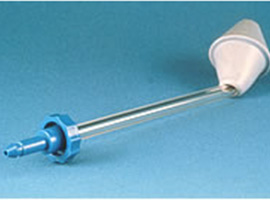The best treatment of any of forms of rhinosinusitis is to avoid the cause(s) whenever possible. However, in a given patient, it can be very challenging or impossible to determine the cause(s) for their rhinosinusitis. Complicating this is the possibility that rhinosinusitis can also have many causes which compound one-another, thereby worsening the condition. Regardless, once the disorder is present, the primary treatment strategy is to turn off inflammation. This reduces sinus swelling, unblocks the sinuses, and permits the return of normal mucus drainage. Depending on its cause(s) several simultaneous medications may be required. Once the normal protective barriers and “mucus blanket” are restored medications are discontinued.
Depending upon the severity and complexity of the rhinosinusitis several types of treatments may be used and include but are not limited to:

Grossan Irrigation tip for Waterpik®

Syringe for Nasal Irrigation
In many people with rhinosinusitis, the lining of the nose and sinuses can be very sensitive to environmental pollutants, allergies, temperature changes, stress, aspiring related products and certain foods. This sensitivity may be genetically predisposed. Should such a patient be exposed to a viral infection the amount of inflammation they experience in this setting is substantially worse. Treatment of the infection, even when it is low-grade, may result, overtime, in a significant improvement in the symptoms of hyper-reactivity.
If you smoke cigarettes, you should quit promptly. If you recognize a substance you are allergic to, you should avoid it as much as possible, and consider treatment by an allergy specialist. If you have any underlying medical condition or illness, you should be under the care of an appropriate physician. Your general state of health and nutrition affects every part of your body, including your sinuses. For this reason, we advocate maintaining a healthy diet, including taking vitamin supplements (See Information Sheet on Dietary Supplements & OTC Nasal Sprays/Drops), and getting regular exercise.
Recurrent infection is often treated successfully with medication alone. Several medications may be used in combination with an antibiotic to decrease swelling and help the nose drain infectious material.
Please be sure to read the information that is in this brochure pertaining to each medication you are prescribed.
The influenza immunization plays an important role in medical therapy. This is especially true for groups at high risk for influenza-related complications. This includes persons greater than 55 years old, residents of nursing homes or long-term care facilities, people with chronic disorders of the pulmonary or cardiovascular system, and patients with chronic metabolic diseases, renal dysfunction, hemoglobinopathies or immunosuppression. The best time to have the flu shot is October to mid-November before the start of the influenza season.
While many cases of rhinosinusitis can be successfully treated with medications alone, surgery is sometimes necessary. If surgery is planned, remember not to take aspirin within 10 days of the procedure or other non-steroidal anti-inflammatory agents (NSAIDs, such as ibuprofen) within 5 days of the planned procedure. Excessive and undesirable bleeding during surgery may otherwise occur. Products containing these compounds should also be avoided. Also remember to notify your physician if you have any medical condition (such as mitral valve prolapse or a prosthetic valve) requiring prophylactic antibiotics before surgery. If your surgeon offers surgery as an option for treatment of your sinus disease, you should read our brochures on this subject.